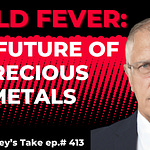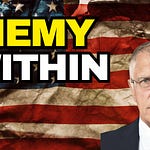War isn’t limited to tanks, aircraft carriers, and drones. Much of war is fought by unconventional means. Looking at last week’s headlines, it’s easy to conclude that war is already upon us and ramping up.
Consider what’s happening both at home and abroad, then look at the summary of unconventional warfare tactics below…
Some news from just the last week…
In Economic terms; “This is WW3”
In Kunstler's latest Podcast episode, his guest, Jeff Rubin says,
“In economic terms this is World War 3. In 1960 4% of global GDP was subject to sanctions. Today, it's almost 40% and at the rate we're going it'll soon be 50%.”
Europe Agrees to Give Russia's Billions to Ukraine (msn.com)
The European Union on Tuesday approved a plan to hand Ukraine the profits generated by frozen Russian central bank assets.
"We have approved in the EU using revenues from Russia's central bank's frozen assets to help Ukraine," wrote Lipavsky on X, formerly Twitter. "Up to €3B only this year, 90% goes for Ukraine's military. Russia must pay for its war damages."
Gold and sIlver prices continue record high runs (yahoo.com)
Alliances, Assassinations, Coup attempts, and color revolutions:
Putin Goes to China. Major takeaways
“New Era” Partnership:
In a joint statement, Putin and Chinese President Xi Jinping pledged a “new era” of partnership between the two powerful rivals of the U.S.
They cast the U.S. as an aggressive Cold War hegemon sowing chaos worldwide.
Their shared opposition to the U.S. extends to security issues, Taiwan, Ukraine, North Korea, and cooperation on nuclear technologies and finance1.
Signaling Priorities:
By choosing China for his first foreign trip after being sworn in for another six-year term, Putin emphasizes his priorities.
The red carpet welcome and personal ties with Xi underscore the strength of their partnership2.
Grievances Against the U.S.:
Russia and China expressed concerns about U.S. actions:
Violating the strategic balance through global missile defense deployment.
Developing high-precision non-nuclear weapons for potential “decapitation” strikes.
Extending nuclear deterrence with allies, including Australia1.
Slovakia Probing Broader Conspiracy In Assassination Attempt On PM Fico
ON SUNDAY, AUTHORITIES SAID THAT COOPERATION WITH DOMESTIC AND FOREIGN INTELLIGENCE SERVICES HAD LED TO A BROADENING OF THE PROBE, TO INCLUDE A VERSION IN WHICH A GROUP – WHICH WASN’T IDENTIFIED – MAY HAVE BEEN LINKED TO THE CRIME.
Georgia Dreaming: Is Another Color Revolution About to Kick Off? (msn.com)
As protesters besieged the Georgian parliament, a delegation from the body junketed to DC to meet with the CIA cutout NED, which has spent years pumping up opposition activists with loads of cash ACTIVE MEASURES investigates the leaders of the color revolution in Georgia
https://x.com/activemeasures8/status/1790759041947635730?s=12
Congo names third American in a foiled coup plot as mourners gather in Utah to remember plot leader (msn.com)
https://x.com/zerosum24/status/1792377988987924968 Interesting video
Helicopter crash that killed Iran's president and others could reverberate across the Middle East (msn.com)
Description of the crash accident of the Iranian president's helicopter from the words of his chief of staff who was present in the 3rd helicopter behind them: Transcribed from video interview here: https://x.com/aryjeay/status/1792940529526747394?s=12
After our noon prayers, we departed towards the direction of Tabriz. The weather was clear, there was no weather condition to be worried about. After half an hour being in the air, prior to reaching the Sungun copper mine, there was a small patch of clouds; interviewer asks: “So there was no fog?” He replied, not at all. There was fog on the ground, but not in up the air where we were advancing with the helicopters. However in one small compacted area, there was a small patch of clouds above a cliff. In terms of height, this cloud was on the same height as our flight’s height.
It was there when the now-martyred helicopter pilot, who was also the commander of the fleet, that told the rest of the pilots to ascend above the clouds. We were the 3rd pilot, behind the president’s helicopter. We came above the clouds, we advanced for approximately 30 seconds. Our pilot suddenly realised that the main helicopter carrying the president is missing.
Interviewer asks: “You didn’t see the helicopter anymore after ascending?”
He replied, yes exactly, after ascending above the clouds, we didn’t see the main helicopter. The ascension itself didn’t feel difficult or hard. Sometimes, when we use the plane we feel turbulence but we didn’t feel anything at all inside the helicopter this time, when ascending. And after we ascended there were no other clouds.
Interviewer asks: “So beyond this, there were no weather forecasts mentioning any disturbances in the weather to make it unsafe?” He replied, no there wasn’t any.
Shortly after, we were able to see beneath us and there were no clouds anymore and we had reached the area of the copper mine. We realised however that our pilot is making an U-turn suddenly so I asked him why? He said that one of our helicopters is missing. We estimate that they made an emergency landing, because we also have no radio contact with it anymore. So I asked him when was the last time contact was made? The pilot answered: “A minute and 30 seconds ago, when the pilot told us to ascend above the clouds.”
Our pilot circled around the area a couple of times, but the area with the cloud patch was also invisible to us and it was too risky to enter that area. We failed several times to make any radio contact. We were forced to make a landing after 30 seconds at the Sungun copper mine to investigate.
During the flight, we had continuous cell phone calls with the passengers, including the bodyguard, Mr. Abdollahian, the governor of East-Azerbaijan and the Friday imam of Tabriz. However we tried calling all of them without luck.
After some tries, calling the cellphone of the captain accompanying the president, someone picked the phone. It was Ayatollah Hashem, the friday imam of Tabriz. He told us that I’m not feeling well. He didn’t tell us anything special. I asked him what exactly has happened? He told us that he didn’t know what has happened, when asked on his whereabouts, he said that he didn’t know. He only described what he could see, described to us what he saw, e.g. surrounded by trees. I asked him about the condition of the others, the Ayatollah replied that he’s alone and couldn’t see anyone else and he’s alone.
The copper mine had good facilities such as ambulances and the necessary vehicles. We formed a team to go and search for them. We requested for immediate emergency help as well.
Preparing the Public in Europe:
Poland forms Russian influence commission as spy fears grow
"I issued an order on the establishment of a commission to investigate Russian and Belarusian influence on the internal security and interests of the Republic of Poland in the years 2004-2024," Prime Minister Donald Tusk told a news conference.
He named the head of the Military Counterintelligence Service, General Jaroslaw Strozyk, as head of the commission.Reviving the commission marks a turnaround for Tusk.
The body was formed last year by Poland's previous nationalist Law and Justice (PiS) government and condemned at the time by Tusk's Civic Coalition (KO) grouping as a vehicle for a witch hunt against him, as it could ban politicians from office.
Tusk said the commission would consist of 9-13 members, who would be chosen next week from recommendations from government officials including the interior, defence and foreign ministers.
Russia's 'brazen' and intensifying sabotage campaign across Europe (nbcnews.com)
Russia is conducting a sabotage campaign across Europe in an increasingly aggressive effort by President Vladimir Putin to undermine Western support for Ukraine, seeking to damage railways, military bases and other sites used to supply arms to Kyiv, U.S. and European officials say.
Poland arrests nine suspects over alleged Russian sabotage plot | Poland | The Guardian
“We currently have nine suspects detained and indicted, who have been directly implicated in the name of Russian (intelligence) services in acts of sabotage in Poland,” Tusk told private broadcaster TVN24.
“These are Ukrainian, Belarusian and Polish citizens,” Tusk said, suggesting some may have been recruited from criminal circles.
Those detained are accused of “beatings, arson and attempted arson,” according to Tusk, who said the Russian plots concern not just Poland, but also Lithuania, Latvia and possibly Sweden.
Europe Sees Signs of Russian Sabotage but Hesitates to Blame Kremlin - WSJ
NATO issued an exceptionally blunt statement this month accusing Russia of waging “an intensifying campaign of…sabotage, acts of violence, cyber and electronic interference, disinformation campaigns, and other hybrid operations.”
Latvias 'Prepare for War' guide. An extensive document detailing NATOs plan for civilians in a war with Russia. Don't be fooled by PG artwork, this is doc is hardcore
English translation download here.
Summary
The Latvian government published this “Prepare for War” guide aimed at the its civilian population. This document provides comprehensive guidance for the Latvian population on how to prepare for and respond to a potential war or military conflict. It covers a wide range of essential topics, including individual and community resilience, preparing homes and supplies, seeking information and communication, cybersecurity, protecting against misinformation, and actions to take in various emergency scenarios. The key emphasis is on building a culture of crisis preparedness, individual responsibility, and collective readiness to support national defense efforts.
Key Points
Prepare your home with essential supplies like water, food, medicine, and emergency equipment to be self-sufficient for at least 72 hours, but ideally longer.
Know how to properly use shelters and places of refuge to protect yourself from blast, debris, radiation, and other dangers.
Be cautious of misinformation and only trust verified official sources for news and instructions.
Maintain good mental health practices like adequate sleep, limiting information intake, and seeking professional help if needed.
Actively support the Latvian National Armed Forces through intelligence gathering, logistics, and non-violent resistance in occupied areas.
Recognize that self-defense and supporting national defense is a duty for all citizens to ensure the country's survival.
Don't believe the news that the Armed Forces have stopped fighting and NATO will not help. This is a common way of demoralising the population. And remember that in the event of an enemy attack, the NBS will resist relentlessly
What to do during a shooting If your house is caught in a regular armed conflict, it is necessary to reinforce the windows (e.g. with adhesive tape) - this will help prevent broken glass from scattering. If possible, reinforce windows with sandbags or solid furniture, for example. If a shooting starts and you cannot take shelter in a shelter (the basement of the building), take shelter in a 'double-walled' room in your house or apartment - a room where you are protected by at least two walls.
How to prepare for an enemy siege To minimise casualties and maximise survival, civilians need to prepare. This chapter lists the most important areas where civilians need training.
The community must agree on the storage and distribution of food and other supplies, hygiene measures and the disposal of dead bodies. Discussing difficult topics before they become a reality will reduce shock and strengthen the will to resist the intruder.
Relations between civilians and military As the city adapts to life in a war zone, it will begin to divide into localised areas.
These geographical areas may contain booby traps, various restrictions, contaminated soil, etc. Therefore, town groups should appoint confidants to meet with military representatives of the NCA/NATO or the aggressor's armed forces, depending on which country controls the territory, to discuss issues affecting the security of civilians. The Community should empower these persons to take decisions in interaction with military personnel.
Military Moves
NATO - Steadfast Defender 2024
Still Happening in Europe Estimated through May 31, 2024: Steadfast Defender 24, NATO’s largest military exercise since the Cold War, features over 90,000 troops from all 32 NATO Allies. These forces engage in multi-domain operations across land, sea, air, space, and cyberspace. Additionally, the exercise includes more than 50 naval assets, over 80 aircraft, and over 1,100 combat vehicles. The goal is to demonstrate NATO’s ability to defend its territory and protect each other from any threat12.
The Steadfast Defender 2024 exercise strategically spans several key European countries, including Finland, Estonia, Germany, Greece, Hungary, Latvia, Lithuania, Norway, Poland, Romania, Slovakia, Sweden, and the United Kingdom. The events take place from the end of January to May 31, 2024, divided into two parts12.
Russia starts exercise to simulate launch of tactical nuclear weapons (msn.com)
Russian forces have started the first stage of exercises ordered by President Vladimir Putin to simulate preparation for the launch of tactical nuclear weapons, the Defence Ministry said on Tuesday.
The Defence Ministry said the first stage of the exercise involved Iskander and Kinzhal missiles.
The ministry said troops were practising obtaining "special ammunition" - meaning nuclear warheads - for Iskander missiles, equipping launch vehicles with them and "covertly advancing to the designated position in preparation for missile launches".
European NATO Countries Expand Military Training for Civilians as Bulgaria Prepares Its Own Strategy - Novinite.com - Sofia News Agency
many NATO countries are initiating dialogues on civilian military training. For instance, the Polish Army has launched a summer program called "Vacation with the Army," where Polish men and women aged 18-35 can enroll in a 27-day basic military training at one of 70 bases, earning around 1,520 USD. Norway is increasing its number of conscript soldiers, while Denmark plans to introduce conscription for women by 2026 and extend service from four to eleven months. Latvia and Sweden have resumed military service, and in Romania, there is a push for faster adoption of defense laws, including voluntary military service for people aged 18-35. Romanian officials are considering long-term military training strategies to avoid a future shortage of reservists. Military expert Yordan Bozhilov attributes these moves to Russia's war in Ukraine but clarifies they are not preparations for war.
Poland invests €2.2 billion in reinforcing its border with Russia and Belarus | Euronews
Tusk revealed that the Shield-East project, which includes building military fortifications, has already begun. Emphasising Poland's strategic position on NATO's and the European Union's eastern flank, Tusk highlighted the country's responsibility for Europe's security.
As Russia Advances, NATO Considers Sending Trainers Into Ukraine
NATO allies are inching closer to sending troops into Ukraine to train Ukrainian forces, a move that would be another blurring of a previous red line and could draw the United States and Europe more directly into the war.
So far the United States has said no, but Gen. Charles Q. Brown Jr., the chairman of the Joint Chiefs of Staff, said on Thursday that a NATO deployment of trainers appeared inevitable. “We’ll get there eventually, over time,” he said.
NATO last month asked Gen. Christopher G. Cavoli, the supreme allied commander for Europe, to come up with a way for the alliance to do more to help Ukraine that would mitigate risks. A U.S. official said on Wednesday that one possibility could be training Ukrainian troops in Lviv, near the country’s western border with Poland.
Other NATO allies, including Britain, Germany and France, are working to base defense contractors in Ukraine to help build and repair weapons systems closer to the combat zone — what military officials have described as a “fix it forward” approach. Current and former U.S. defense officials said the White House is now reviewing its ban on allowing American defense contractors in Ukraine, although a small number have already been allowed in, under State Department authorities, to work on specific weapons systems like Patriot air defenses.
What am I missing?














